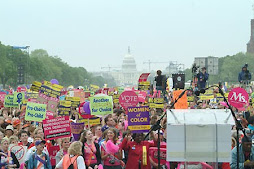The shooting of Representative Gabrielle Giffords is already spawning an industry of commentary, some more thoughtful than others. I agree with blogger Richard Kim from The Nation that this terrible act is an attack on democracy and on the very idea that we can speak to each other about public matters in public places. But sad as it is, it is nothing new.
Many are saying the shooting is a clear result of the terrible vitriol that has infected politics in recent years. They lay blame rightly or wrongly on the extreme right or the extreme left, on partisanship generally, on Sarah Palin and her infamous "cross-hairs" visual aid, her follow up instruction to fellow conservatives not to retreat but to reload and others who have also used gun imagery and metaphors to rouse the populace against their chosen political enemies. In The Nation, John Nichols reports that colleagues of Ms. Giffords are saying that Sarah Palin needs to take a long look at her behaviour here. The Huffington Post reports that she and her camp have come out to say that their innocent little graphic had nothing to do with the shooting of Representative Giffords.
As a writer, I know words have power. In fact, I depend on this. If I didn't know it to be true, I wouldn't write. So, if someone says they are putting someone or something "in their crosshairs," I know what this means, both metaphorically and literally. I wouldn't write this without thinking about it carefully. It's kind of like when you see a child point a toy gun at a person. The inclination for many of us would be to urge them to stop. At this point, a line is crossed from play to implied violence. (And it begs the question, why do they have a toy gun in the first place, but that's another issue.)
If you characterize someone as the epitome of evil simply because they disagree with your political opinion, if you suggest Armageddon is coming as a result of changes in health care legislation, there is an implied call to action there. Why are we surprised then when someone acts on the call to action?
Matt Bai calls this kind of vitriolic language "rhetorical recklessness" in his piece in the New York Times today. I think this is an excellent phrase.This kind of careless language and reckless rhetoric has plagued the abortion discourse too - another discourse with two sides so far apart, so seemingly irreconcilable, that it seems every day there is an anti-choice person accusing a pro-choice person of being a Nazi, of "genocide," or worse, if there is anything worse than genocide. Again, there is an implied call to action in this kind of language. We should not be surprised when someone acts.
Ultimately, the discourse is framed as a battle of good versus evil. There is no grey area to explore. This absence of middle ground should be our first clue that we've lost our way. There's always grey, isn't there? I read somewhere once that seeing everything as either black or white with no middle ground is a sign of depression. Perhaps we are a culture that is profoundly depressed.
We already see in this incident how anyone who has actually made a gun reference, joked about "getting rid of" the opposition or anything similar is distancing their individual comments from this terrible crime. Similarly, when an abortion doctor is killed, members of the broader anti-choice movement distance themselves. The murderer is a "lone gunman," a zealot, a nut, and certainly unaffiliated with any "legitimate" organization. He or she is allegedly unconnected to the broader group who create the context and use language that supports the violence. None of us are free from social context. This is why articles like Jane Kirby's "Freedom of (Hate) Speech" in Briarpatch (mentioned in this blog before) are so important for us to consider thoughtfully.
It is vital that we confront the people who use this language and make these excessive comparisons and illogical metaphors and use language whose sole purpose is to incense and not to educate or inform. We cannot leave this kind of reckless rhetoric unchallenged, no matter what side it comes from.
As always, the most destabilizing and destructive aspects of what is often misnamed the "abortion debate" has something to teach us about wider discourses. Let's look to the examples of those who have promoted a healthy approach to this topic, and see what we can learn from their efforts in broader politics. We must be able to speak to each other about public issues in public places. This matters. But we have to be mindful of how we do it. We can't employ shocking language to gain attention and think for a minute that this doesn't have consequences.
Words have consequences. We all have to remember that.
Subscribe to:
Post Comments (Atom)






A commenter asks, "What kind of efforts?" One example is the Difficult Dialogues Initiative.
ReplyDeletehttp://www.difficultdialogues.org/
This is a great initiative funded by the Ford Foundation. It is meant to help people discuss difficult and divisive issues on campus. I can't be certain from the website, but it doesn't look like funding has continued into 2011. Maybe it should. The Abortion Monologues was chosen as part of the difficult dialogues initiative at the University of Texas, Brownsville last year when they decided to talk about abortion. I was delighted. Another effort I participated in was the Munk Debates. I don't think it was as effective as the first because debates are meant to have winners and losers, but at least they are trying to get people talking.
Thank you, Jane, for yet another thoughtful and cogent piece. I keep thinking about how easy it is to hate, how much more effort is required to build bridges across difference.
ReplyDelete